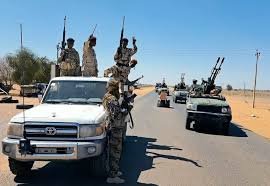A DEVASTATING fire outbreak has gutted the Masaka Market in Karu Local Government Area of Nasarawa State, reducing hundreds of shops to ashes and leaving traders in despair.
The fire which started late Friday night around 10:30 p.m., raged into the early hours of Saturday and destroyed goods and valuables worth millions of naira.
Eyewitnesses described the scene as “pathetic,” as helpless traders watched their livelihoods consumed by flames. “We rushed to the market and found everything engulfed in flames,” said Joseph Jatau, a resident who witnessed the incident. “Community members called the fire service but they arrived late, citing a lack of water.”
The fire reportedly spread rapidly, catching many traders unaware.
One of the affected traders, Usman Aliyu said that over 500 shops were destroyed. “The entire market has been burnt down, including food storage areas.”
Videos from the site revealed traders wailing over their losses while scavengers sifted through the debris.
This tragedy is not new to the Masaka Market. A similar fire outbreak occurred in 2019, causing extensive damage.
Governor Abdullahi Sule of Nasarawa State visited the Masaka Market on Saturday, pledging support for affected traders.
However, the lack of immediate fire service response and the recurring nature of such incidents have sparked widespread criticism of the government’s preparedness and infrastructure.
“We need better fire safety measures,” Aliyu pleaded. “This is the second time this market is burning, and we’ve lost everything.”
The Explainer noted that the recurrence reflects a broader issue across Nigeria where market fires have become distressingly common.
Nigeria has a long history of devastating market fires, with incidents frequently reported in major cities like Lagos, Onitsha, and Kano. Between November 2020 and August 2021, over 50 fire outbreaks were recorded in different markets across Nigeria.
Traders Across the Country Count Losses
From Lagos to Ibadan, Abuja to Sokoto and Edo, traders watched helplessly as their toils over the years were burnt down in hours.
Media reports showed that from November 2020, most of the fire incidents happened in the south-west region of the country.
The Explainer found that Oyo recorded the highest number of market fires with 20 incidents, followed by Lagos with 15 incidents and Abuja had three cases.
The Lagos State Government on Sunday disclosed that a total of 1,749 fire incidents were recorded in the state over the past year, urging members of the public to always provide information to help reduce fire outbreaks.
One of the most significant incidents occurred in December 2006, when a pipeline leakage in the Abule-Egba area of Lagos led to an explosion, killing numerous residents. Similarly, public buildings like the Unity Bank Headquarters in Lagos and Bayero University, Kano, have also been victims of fire outbreaks, resulting in the loss of vital records and disrupting essential services.
Beyond markets, Nigeria has faced deadly pipeline explosions and tanker accidents. In October 2024, a gasoline tanker overturned and exploded in Jigawa State, killing over 140 people, including children.
These incidents often occur due to fuel theft and an overreliance on road transportation for fuel distribution. Even waterways are not exempt from such tragedies. In August 2024, a boat explosion in Bayelsa State claimed the lives of at least 20 traders travelling to coastal communities.
The fire reportedly started due to poor maintenance and overcrowding, common issues in Nigeria’s transportation sector.
Experts have long called for improved fire safety protocols, including regular inspections, functional fire hydrants, and well-equipped emergency services. Yet, these calls often go unheeded, leaving communities vulnerable to devastating losses.























